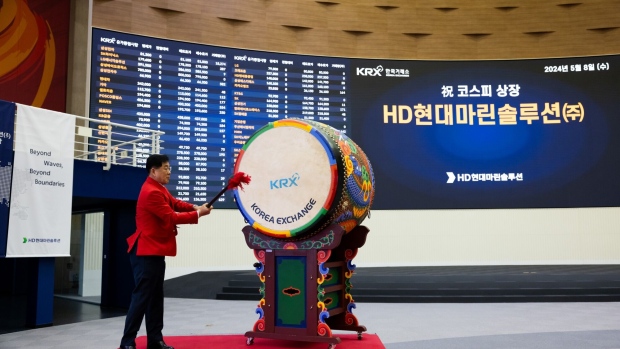May 9, 2024
KKR-Backed Ship Repair Firm to Use IPO Proceeds to Boost Growth
, Bloomberg News

(Bloomberg) -- Only a day after completing South Korea’s biggest initial public offering in two years, KKR & Co.-backed shipping repair company HD Hyundai Marine Solution Co. has revealed its next goals — 25% growth in annual revenue for the next three years and increased investments to tackle maritime emissions.
Hyundai Marine’s stock surged 97% on its first day of trading Wednesday, pushing the company’s market value above 7.2 trillion won ($5.3 billion) and ranking it just outside the 50 biggest companies on the benchmark Kospi index. The firm raised about $547 million in Korea’s biggest IPO since January 2022, and will use the proceeds to invest in shipyards in Southeast Asia, increase warehouse capacity and develop technologies for renovating vessels in greener ways, Chief Executive Officer Lee Ki-dong said.
“We showed at least 25% growth for the last six years from after-market business,” Lee said in an interview Thursday at his office in Seongnam, south of Seoul. “We will show this growth for the next three years,” he said, adding the company is in talks with a number of shipping firms for potential orders to retrofit vessels into methanol-powered, dual-fuel ships.
The deals could be announced later this year, Lee said.
Shipping firms, which account for about 3% of man-made carbon dioxide emissions, are racing to decarbonize their fleets as pressure intensifies from customers and authorities. In Europe, shippers started paying for carbon emissions this year on the bloc’s Emissions Trading System, while A.P. Moller-Maersk A/S unveiled the world’s first large container ship powered by methanol in Korea in January.
About 80% of the market for retrofitting ships is for older-generation technology, such as replacing scrubbers — exhaust gas cleaning systems that remove particulate matter and harmful substances. Hyundai Marine is targeting a new market that requires cutting-edge technology to make ships emit less carbon, such as dual-fuel engines or improving an old LNG vessel into a Floating, Storage, Regasification Unit, or FSRU, Lee said. Hyundai Marine holds about a decade-long lead over Chinese companies in this area, he said.
While replacing scrubbers costs about $2 million-$3 million per project, Hyundai Marine could earn higher revenues — up to $50 million — from replacing engines for dual-fuel vessels, Lee said.
Read More: Hyundai Marine Aims to Double Sales by Helping Shippers Go Green
Even after the near-doubling of the stock in its trading debut, Lee said the price can go higher. The shares were up a further 6% on Thursday.
The company will also make efforts to engineer a “soft exit” by KKR, which retained a 24% stake after the IPO, making it the top shareholder.
“Ultimately KKR will exit, but it’s hard for me to say how long it’s going to take,” Lee said. “We’re going to cooperate with them and continue to look for other investors as well.”
--With assistance from Filipe Pacheco.
©2024 Bloomberg L.P.






